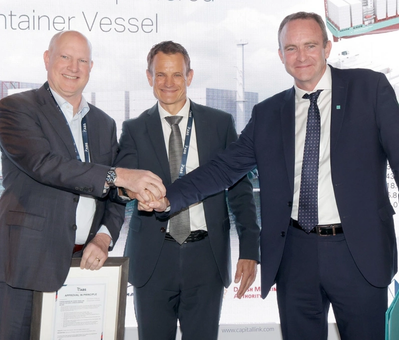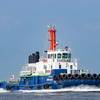Maersk's Ammonia-fueled Box Ship Design Earns Approval in Principle
A. P. Møller-Mærsk's newly developed design for an ammonia-fuelled 3,500 TEU container vessel has earned approval in principle (AIP) from classification societies Lloyd’s Register (LR) and the American Bureau of Shipping (ABS).
Led by the Mærsk Mc-Kinney Møller Center for Zero Carbon Shipping, the design project also involved MAN Energy Solutions, Deltamarin, Eltronic FuelTech.
“To unlock the potential of sustainable ammonia as an alternative, low-emissions marine fuel, we must carefully address the safety issues on board and ensure a safe and healthy working environment for our seafarers and people in ports. The AIP of the new ship design is a major milestone on this journey, as it demonstrates that safety criteria for the application of ammonia as the main fuel is within tolerable levels of industry safety management practices,” said Claus W. Graugaard, Chief Technology Officer, Onboard Vessel Solutions at the Mærsk Mc-Kinney Møller Center for Zero Carbon Shipping.
“The fact that we have both ABS and LR granting this AIP in parallel is a testimony to the robustness of the design and to the iterative risk assessment and systematic risk management intelligence that have gone into it. This development work has only been possible because all project partners have contributed with innovative thinking and willingness to share knowledge. Collaboration is the fastest way to co-creating the prescriptive rules and innovative solutions we need,” Graugaard added.
When awarding an AIP, the classification societies perform a novel technology evaluation to examine all fundamental aspects of the ship design and general compliance with the associated rules/regulations.
Next, the remarks raised on the design will be addressed and the Mærsk Mc-Kinney Møller Center for Zero Carbon Shipping continues to lead this work looking into extending the project to a second phase with partners including a charterer and ship owner.
“Safety remains a critical aspect for the widespread adoption of ammonia as a marine fuel. This AIP demonstrates a clear cross-sector intention to ensure that ambition becomes reality,” said Andy McKeran, Chief Commercial Officer of Lloyd’s Register. “Through our previous collaborations, including the joint study with the Mærsk Mc-Kinney Møller Center for Zero Carbon Shipping and the LR Maritime Decarbonisation Hub into Quantitative Risk Assessment for ammonia ship design, LR has continued to build on its expertise as a trusted adviser to the maritime value chain, enabling us to put the mitigation of risks for ammonia vessels at the heart of our AIP process.”














